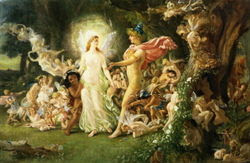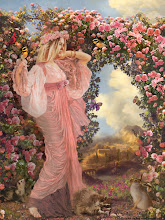"I do believe in Fairies. I do. I do."
เพลง : A Life So Changes
ประกอบภาพยนตร์เรื่อง Titanic
[เพลงนี้น่าขนลุกยิ่งกว่าอีก]
 ++Fairy++
++Fairy++A fairy (also faery, faerie, or fae; collectively wee folk, good folk, people of peace and other euphemisms) is a spirit or supernatural being that is found in the legends, folklore, and mythology of many cultures.
 The term "fairy" came into use in the folklore of Western Europe in the medieval era; it has been applied to supernatural beings of many different cultures, both those similar to, and distinctly different from, the Western European "fairy" (see List of beings referred to as fairies). Even in folkore that uses the term "fairy", there are many definitions of what constitutes a fairy. Sometimes the term is used to describe any magical creature, including goblins or gnomes, and at other times only to describe a specific type of more ethereal creature.
The term "fairy" came into use in the folklore of Western Europe in the medieval era; it has been applied to supernatural beings of many different cultures, both those similar to, and distinctly different from, the Western European "fairy" (see List of beings referred to as fairies). Even in folkore that uses the term "fairy", there are many definitions of what constitutes a fairy. Sometimes the term is used to describe any magical creature, including goblins or gnomes, and at other times only to describe a specific type of more ethereal creature.Fairies are generally described as human in appearance, though of variable size, and with magical powers. Their origins are less clear in the folklore, being variously the dead, or some form of angels, or a species completely independent of humans or angels. Folklorists have suggested that their actual origin lies in a conquered race living in hiding, or in religious beliefs that lost currency with the advent of Christianity.
Much of the folklore about fairies revolves about protection from their malice, by such means as cold iron or charms of rowan and herbs, or avoiding offense by shunning locations known to be theirs. In particular, folklore describes how to prevent the fairies from stealing babies and substituting changelings, and abducting older people as well.
Many folktales are told of fairies, and they appear as characters in stories from medieval tales of chivalry, to Victorian fairy tales, and up to the present day in modern literature.
Etymology
The words fae and færie came to English from Old French, and originated in the Latin word "Fata" which referred to the three mythological personifications of destiny, the Greek Moirae (Roman Parcae, "sparing ones", or Fatae) who were supposed to appear three nights after a child's birth to determine the course of its life. They were usually described as col d, remorseless old crones or hags (in contrast to the modern, more conventionally beautiful depictions). The Latin word evolved into the modern Italian fata, Catalan and Portuguese fada and Spanish hada, all of which mean fairy. The Old French fée, had the meaning "enchanter." Thus féerie meant a "state of fée" or "a state of enchantment." Fairies are often depicted enchanting humans, casting illusions to alter emotions and perceptions so as to make themselves at times alluring, frightening, or invisible. Modern English inherited the two terms "fae" and "fairy," along with all the associations attached to them.
d, remorseless old crones or hags (in contrast to the modern, more conventionally beautiful depictions). The Latin word evolved into the modern Italian fata, Catalan and Portuguese fada and Spanish hada, all of which mean fairy. The Old French fée, had the meaning "enchanter." Thus féerie meant a "state of fée" or "a state of enchantment." Fairies are often depicted enchanting humans, casting illusions to alter emotions and perceptions so as to make themselves at times alluring, frightening, or invisible. Modern English inherited the two terms "fae" and "fairy," along with all the associations attached to them.
A similar word, "fey," has historically meant "doomed to die," mostly in Scotland, which tied in with the original meaning of fate. It has now gained the meaning "touched by otherworldly or magical quality; clairvoyant, supernatural."[citation needed] In modern English, the word seems to be conjoining into "fae" as variant spelling. If "fey" derives from "fata," then the word history of the two words is the same.



0 Comments:
Post a Comment
<< Home